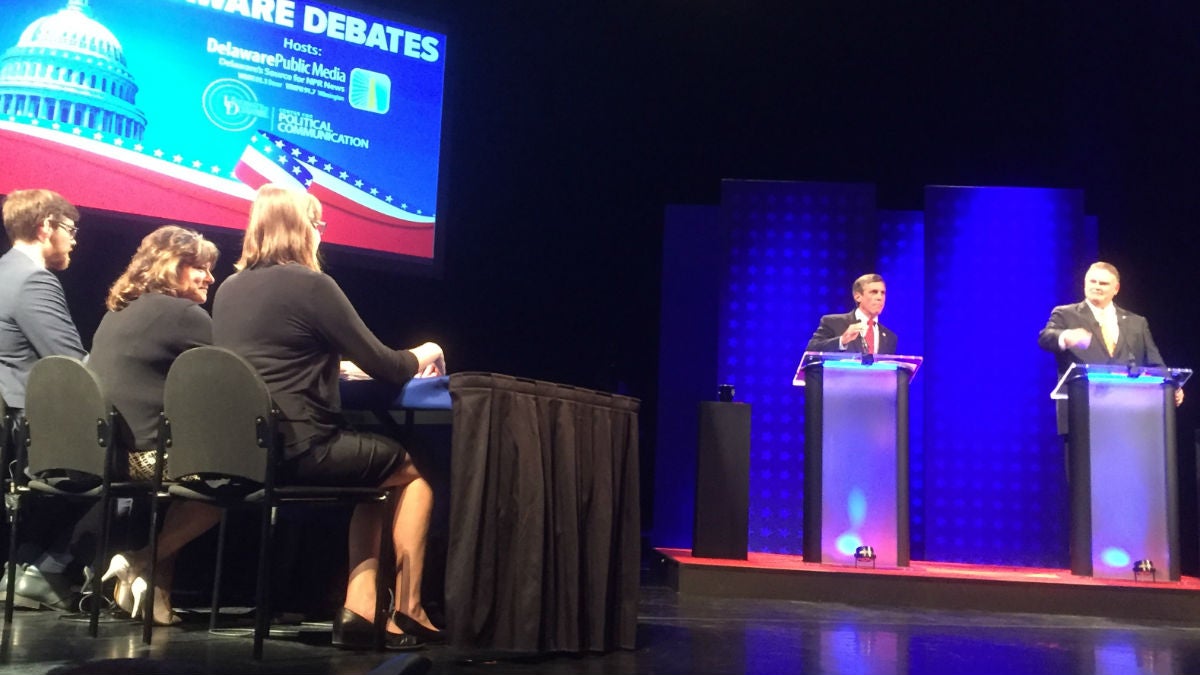Gubernatorial, congressional candidates face off in UD debates

Democrat John Carney (left) debates his Republican opponent Colin Bonini Wednesday night at the University of Delaware. (Zoë Read/WHYY)
The University of Delaware hosted two debates at Mitchell Hall in Newark Wednesday night to help voters make decisions at the polls Nov. 8.
U.S. Congressman John Carney, D-Delaware, faced State Sen. Colin Bonini, R-Dover, during a gubernatorial debate, while former Secretary of Labor Lisa Blunt Rochester faced Air Force veteran Hans Reigle during a congressional debate.
The 55-minute debates were mild-mannered as candidates discussed jobs and the economy, public safety, global affairs and social issues.
Blunt Rochester vs. Reigle
When discussing the economy, republican Reigle said the federal budget needs to be cut by 2 percent.
“I’m absolutely concerned about the national debt. If this keeps going in the same direction it’s going there won’t be an America to protect” he said. “There’s a lot of fraud and waste in government. There’s millions of dollars in waste in the Social Security program.”
Democrat Blunt Rochester said cutting the budget is difficult to accomplish without cutting necessary social services.
“It takes a lot of time and effort to look at the budget, and working together with stakeholders to make those cuts happen,” she said.
When discussing global affairs, Blunt Rochester said she doesn’t currently support sending troops to Syria to address the country’s civil war.
“I am in support of working with our allies in that region and around the world,” she said.
Reigle said he agrees diplomacy is the first choice, but he would put his trust in generals’ decisions on what specific military action to take.
“Whether we should have gone into Iraq or not is a subject of debate,” he said. “We left in a rush and we created a power vacuum in Iraq and we’re kind of responsible of cleaning that mess up. I think it’s important continue to support the Iraqi government.”
Reigle said he supports legal immigration, but he doesn’t agree with allowing refugees into the state.
“We have to secure our borders. We need to figure out who is in America and do things like track expired visas,” he said. “I do not believe in sanctuary cities or states.”
Blunt Rochester disagrees, and said there needs to be more diplomacy in the U.S. and abroad.
“The hate speech even coming from a presidential candidate does not advance us in the direction of peace at home or abroad,” she said. “That’s one of our biggest threats is people feeling disenfranchised in our own country. We can’t continue to speak the way we speak and think we’re going to get positive outcomes.”
Reigle and Blunt Rochester also discussed gun violence and protecting citizens. Reigle said he would support armed teachers in classrooms if they had law enforcement experience.
“I totally respect the right of law abiding citizens to own guns,” he said. “I think one of the first steps we need to take is prosecute people who do have guns who shouldn’t have them. Criminals go after weak people and they target weak people. That’s why they take guns to places like discos and schools.”
While Blunt Rochester said she supports the second amendment, there needs to be tighter gun restrictions. She said she would reinstate the elimination of assault weapons, close loopholes and address mental health issues.
“It’s important families not have to go to funerals instead of graduations. While I’m in support of our second amendment right, things have gotten crazy with guns in our country,” Blunt Rochester said. “This is one of those issues touching one too many families, and we have to stand up to the NRA and others who would try to influence the process through money and intimidation.”
When discussing the Affordable Care Act, also known as “Obamacare,” Blunt Rochester said she would like to continue the healthcare system, but said there needs to be improvements, such as lowering costs of deductibles. Reigle said it should either be repaired, reformed or replaced, and that free market policies could help reform.
“[If not] It’s going to bankrupt this nation further,” he said.
Both candidates agree higher education is too expensive, however, they have different opinions on how to approach it. Reigle doesn’t believe in free college, and said more attention should be placed on trade jobs.
“College is not the golden ticket to prosperity,” he said. “It’s leading you down the path of, ‘Hey, if you go to college you’re going to be successful.’ You don’t have to go to college. The free college program would bring strain to the budget.”
Blunt Rochester said reducing interest rates on student loans is an important first step, but believes government should take further action.
“I do believe we should aspire to have free college, and if we don’t have the aspiration we will never get there,” she said.
Carney vs. Bonini
Colin Bonini and John Carney started their debate discussing violent crimes in Wilmington.
“If there has been a political failure bigger than the violence in Wilmington I don’t know what it is,” Bonini said.
He said police forces should combine, and sub stations should be established in high-risk neighborhoods to prevent crime.
“We need greater enforcement and more policing in the community,” Bonini said. “Wilmington can’t make progress until people feel safe.”
He also said he believes police are understaffed.
“I realize it may not be the politically correct thing today, but the truth is you can’t better the life of your family until you make them feel safe,” Bonini said. “If you call 911 it might be 45 minutes before you see a state trooper.”
Carney said he would support community policing. However, he said it’s just as important to address the underlying causes of crime.
“We have to address the root causes of these problems, which is academic failure early on in school,” he said. “We need the governor to work with legislators, all the school districts involved, put in place a plan so all children get an education and opportunities to participate in…a more competitive economy like we have today.”
Bonini and Carney also acknowledged budget pressures in state government. Bonini said he would make necessary budget cuts, possibly to items like employee benefits and Medicaid, which he said is creating a deficit.
“That’s one of the best reasons to elect me. I’m not afraid to make those choices,” he said. “Any adult conversations that don’t address those two things is quite frankly not being honest.”
Bonini also said there’s a lack of transparency in the state’s budget.
“We basically passed the budget, $4 billion, in late June, late at night, who knows what’s in it?” he said.
Carney argues bringing revenue into the state is equally challenging.
“We’ve become reliant, while Colin’s been in the senate, on abandoned property revenue that’s going away,” he said. “It’s a $400 to $500 million number, and half of it might not be there next year.”
While discussing various issues facing the state, Carney and Bonini agreed the government needs to address rising sea levels, and money should be funneled to schools and higher education should be more affordable.
However, they disagreed on issues like marijuana legalization and the death penalty.
Carney would support the Supreme Court’s recent decision to find the death penalty unconstitutional, while Bonini would reinstate the death penalty.
Bonini said he’s in favor of marijuana legalization, saying the current decriminalization penalties are similar to traffic violations.
“If we’re going to do it let’s do it all the way. Let’s enforce it so we can knock drug dealers out of business,” he said. “I think if we do that it can keep it out of hands of kids and crack down on the drug trade.”
Carney supports decriminalization and medical marijuana, but does not support complete legalization. He said he would like to wait until medical marijuana has been effective for a number of years first, and said he’s also concerned marijuana could be a gateway drug to heroin.
However, a recent University of Delaware poll showed 61 percent of Delaware registered voters favor legalization.
“Is public opinion an important part in any decision? Absolutely,” Carney said. “I just think there’s a better way to do it, and I’m very concerned with this heroin problem and the connection that might exist.”
At the end of the evening, both candidates made an argument for why Delawareans should vote for them.
“I’m under no illusion this job is going to be easy,” Carney said. “But if you elect me as governor I will make those tough decisions. I won’t forget who I work for.”
Bonini said it’s time to change the status quo, and give Republicans the opportunity to create change.
“I’m asking you to do something very hard. Change is hard. It’s especially hard when your opponent is someone you respect and like,” he said. “Change has to happen and I’m asking people in Delaware to make a hard decision. I believe I could lead Delaware to make that change. I think Delaware needs to go in a different direction.”
WHYY is your source for fact-based, in-depth journalism and information. As a nonprofit organization, we rely on financial support from readers like you. Please give today.





